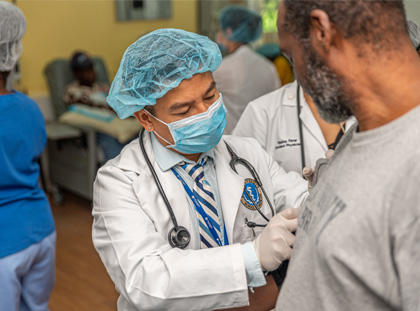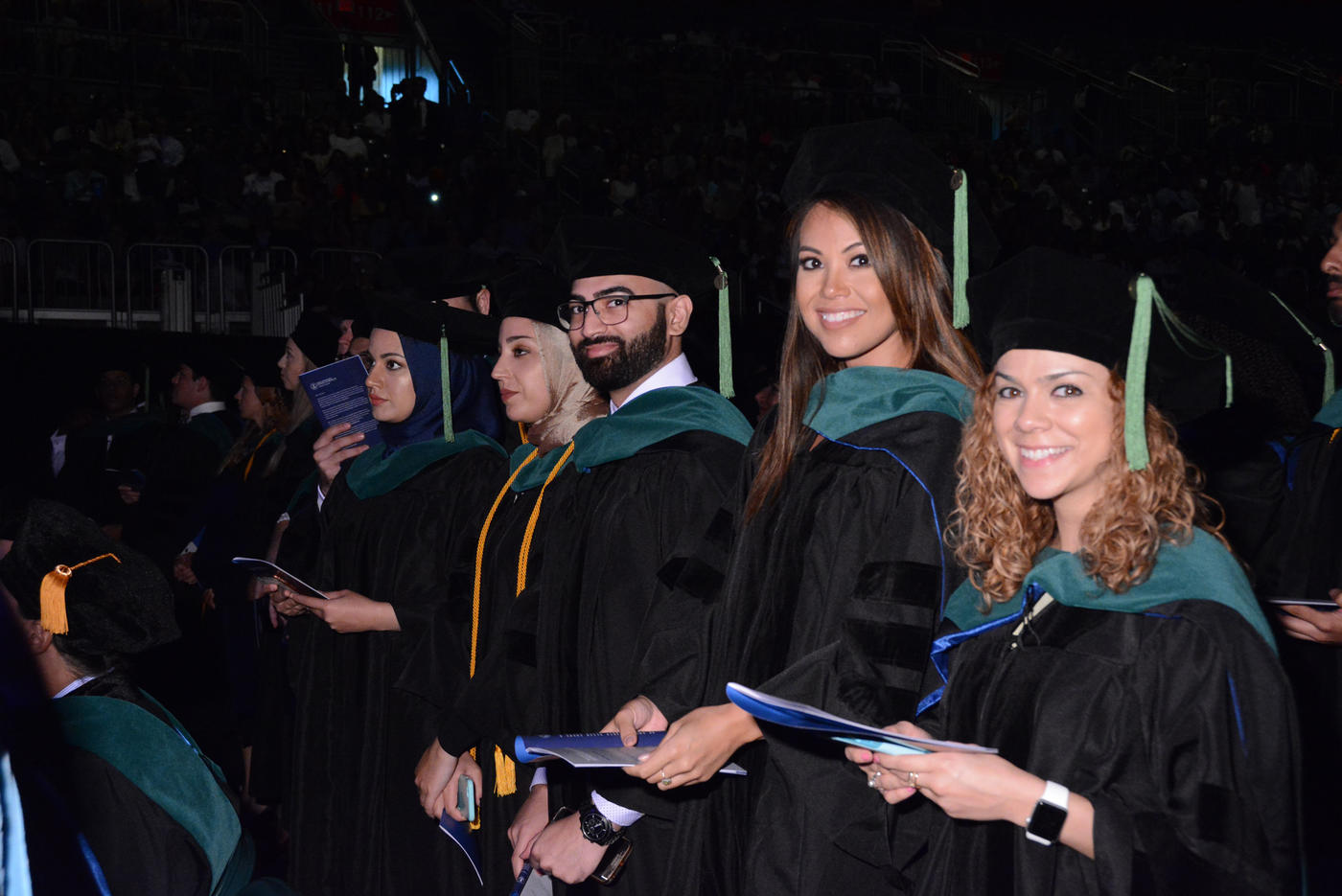Students considering a career as a physician know the difficulty of getting into medical school in the United States and Canada. Many excellent students are turned away, but with a little extra determination, some may still gain entry to an accredited Doctor of Medicine (MD) program. There are excellent opportunities at accredited international medical schools, including Ross University School of Medicine (Ross Med) on the Caribbean island of Barbados.
Accredited international medical schools offer many of the same advantages as medical schools in the United States and Canada. Here are five reasons why going to medical school in the Caribbean—particularly Ross Med—may be the best option for good students determined to practice medicine.
First: A Great Education
The reason students go to medical school is to get a high-quality education that prepares them for medical residency, licensure, and a career as a physician. Students in Caribbean medical schools—many of whom come from the United States and Canada—are there for the same reason. So why do students choose Caribbean medical schools? And why Ross Med in particular?
Several Caribbean medical schools are accredited, including Ross Med, but that does not mean they are all the same. The Ross Med MD curriculum, for instance, meets the standards set by the Liaison Committee on Medical Education® (LCME®), the accreditation authority for medical schools in the United States and Canada that provide MD degrees. This means that Ross Med students enjoy many of the same advantages as medical students in the United States. Students may qualify for federal student loans through the U.S. Department of Education’s William D. Ford Federal Direct Loan Program. Ross Med students may register with the Educational Commission for Foreign Medical Graduates® (ECFMG®) to begin the United States Medical Licensing Examination® (USMLE®) process. And Ross Med graduates may also move on to medical residencies accredited by the Accreditation Council for Graduate Medical Education (ACGME), the residency authority in the United States and Canada.
At the end of the first two years of medical school, students take the USMLE Step 1, also known as “The Boards”—the first big test of the medical licensure process. A medical school may measure its educational program by the success of its students on this first USMLE exam (there are two later tests before licensure), and Ross Med students do well.
From 2018 through 2022, the percentage of Ross Med students who passed the USMLE Step 1 on the first attempt was 89%.*
Another measure of a good medical education is the percentage of students who go on to medical residency. When applying to Caribbean medical schools, it is important to look at their residency placement. Ross Med has a strong history of graduating students earning residencies in a wide variety of disciplines.
For 2022–2023, 98% of first-time eligible Ross Med graduates earned residencies throughout the United States, its territories, and Canada.**
*First-time pass rate is the number of students passing the USMLE Step 1 exam on the first attempt divided by the number of students whose first attempt was in 2018–2022. In order to sit for the USMLE Step 1 exam, students must successfully complete the Medical Sciences curriculum and earn a satisfactory score on the NBME CBSE exam as listed in the student handbook.
**First time residency attainment rate is the percentage of students attaining a 2023–2024 residency position out of all graduates or expected graduates in 2022–2023 who were active applicants in the 2023 NRMP match or who attained a residency position outside the NRMP match.
Second: Support and Research
Going to medical school is not easy, and students may need help with academic or clinical training, as well as support with emotional, social, or physical and mental health issues. Whether they are applying to Caribbean medical schools or American medical schools, students may also need help with housing, balancing family and school obligations, or managing financial aid and residency matches.
Student Support
On day one, each Ross Med student is assigned to a Learning Community to help them successfully navigate their medical school journey. Academic Resources and Support teams connect students to resources, services, and programs that include academic advising, accommodations for students with disabilities, career and personal counseling, preparation for USMLE and National Board of Medical Examiners examinations, study skills enhancement, and wellness resources. Advisory teams are on hand to help students with:
- Health care and counseling
- Student affairs
- Clinical training
- Student finance
- Registrar
- Career development
- Residency applications
Clubs and Organizations
Some welcome diversion may come from extracurricular activities and clubs and organizations which compliment classroom topics and provide additional opportunities for hands-on experiences. As a student going to med school in the Caribbean, groups may explore Barbados and participate in dancing, diving, soccer, and equestrian or other local activities on the island. There are also organizations specifically for Asian, Black, Canadian, Indian, Latino, Christian, Jewish, Muslim, LGBTQIA, and other students.
Special interest and teaching assistant groups cover such topics as:
- Cardiology
- Endocrinology
- Genetics
- Nephrology
- Neurology
- Obstetrics and gynecology
- Oncology
- Pathology
- Pediatrics
- Psychiatry
- Radiology
- Surgery
- Emergency medicine
- Family medicine
- Internal medicine
- Lifestyle medicine
- Sports medicine
The American Medical Student Association (AMSA) and the American Medical Women's Association (AMWA) help educate and inform Ross Med students and connect them with other medical students and professionals around the world.
Research
Ross Med students have the opportunity to sharpen their expertise in scientific processes—and strengthen their profile for the all-important Medical Student Performance Evaluation (MSPE) for residency. All students participate in community-based research beginning in their first semester, providing a deeper understanding of the social determinants of health and health care needs of local communities. This research is threaded throughout all five semesters of the Medical Sciences curriculum, during which students will learn:
- Content composition
- Data collection and analysis
- Posters and presentations
- Research methods
Additionally, Ross Med students publish work or present research studies and findings at conferences and meetings, and the annual RUSM Research Day symposium features numerous presentations on particular themes.
Third: Clinical Training Opportunities
The last two years of medical school usually include the clerkship, or the clinical portion of training. Most clinical training takes place in teaching hospitals. It provides supervised experience working with patients and gives students an idea of which medical specialty they want to pursue. During clinical rotations, students are part of a medical team, led by an attending physician, that includes residents (doctors in training) and interns (first-year residents).
For Ross Med students, clinical training takes place at one or more of the 27 affiliated hospitals with accredited residency programs in the United States. While many medical students move from city to city to complete clinical training at different hospitals, Ross Med students have the option to remain in one location throughout the core Clinical Education curriculum. This can allow a student to concentrate fully on the medical school training—without the hassles and expenses of moving. Elective rotations may take place at a number of other hospitals.
Ross Med's Office of Career Advisement (OCA) provides advice and support to students during the critical clinical rotations as well as during the residency application and matching process. The OCA also prepares students for the USMLE Step 2, which students must pass to earn ECFMG certification and to graduate. Ross Med students’ five-year cumulative first-time pass rate for the USMLE Step 2 CK exam is 93.4%.***
***First-time pass rate is the number of students passing the USMLE Step 2 CK exam on the first attempt divided by the number of students whose first attempt was in 2018–2022. In order to sit for the exam, students must earn an acceptable score on the NBME CCSE as listed in the catalog.
Fourth: Getting in
One of the great advantages of Caribbean medical schools is that they offer opportunities to study medicine to a larger percentage of applicants. Ross Med, for instance, has a more holistic approach to admissions. Holistic admission considers an applicant as a whole person rather than a mere set of grades and scores.
Ros Med’s admission selection committee considers each applicant’s undergraduate performance, knowledge of the medical profession, interpersonal skills, motivation, personal character, and clinical experience in addition to GPA and Medical College Admission Test® (MCAT®) scores. For the 2021-2022 academic year, direct admits to Ross Med had an average MCAT score of 495 and an average undergraduate GPA of 3.21.
Medical Education Readiness Program (MERP)
Additionally, Ross Med applicants may have the opportunity to begin the pursuit of their MD degree through the Medical Education Readiness Program (MERP). MERP is offered to promising Ross Med applicants who could benefit from additional academic support and maximize success in medical school. This 15-week online program is designed to help students succeed and prepare for their first-semester of medical school. Students have the opportunity to build a strong foundation in basic sciences, develop study and learning techniques, and create strong social networks before starting Ross Med’s demanding MD program.
Ross Med’s holistic approach to admissions and the MERP offering combine to give more students the opportunity to pursue successful careers in medicine—opportunities they may not find elsewhere.
Fifth: An Immersive Island Experience
Students must concentrate on their medical studies, of course, but they also need restful downtime and opportunities to do something enjoyable away from classrooms and textbooks. If you are contemplating going to a Caribbean medical school, you should take into account the stunning environment. Ross Med’s home, the beautiful Caribbean island of Barbados, offers many enjoyable things to do, and a tropical climate in which to do them.
From white-sand beaches to expansive golf courses, Barbados is a Caribbean paradise replete with modern comforts. Barbados, a former British colony, retains much British influence in its language and culture as well as in its architecture and such sports as cricket and horse racing.
Ross Med is embedded in the Barbadian community and students have the opportunity to give back through such volunteer opportunities as CPR/AED training, health screenings, and educational opportunities offered to the community through the university. Engage in dynamic educational experiences and diverse learning opportunities while learning medicine through a global lens.
Additionally, hands-on training and experience begin your first semester at Ross Med. These integrated, clinically relevant activities are embedded in Ross Med’s preclinical curriculum, offering you opportunities to apply foundational and behavioral science knowledge to clinical care and engage with diverse patients across Barbados within weeks of beginning your first semester.
Your early clinical experiences may include participation in mobile pop-up clinics, home visits, mental health facilities and outreach programs, pediatric clinics at local schools, and more.
Ross University School of Medicine stands out among Caribbean medical schools by combining medical science, clinical training, and soft skills support in a state-of-the-art educational environment that keeps learning relevant, contemporary, and competitive. Take the next step toward becoming a practicing physician in the United States or Canada: Apply for admission to Ross Med today.
Related resources:



